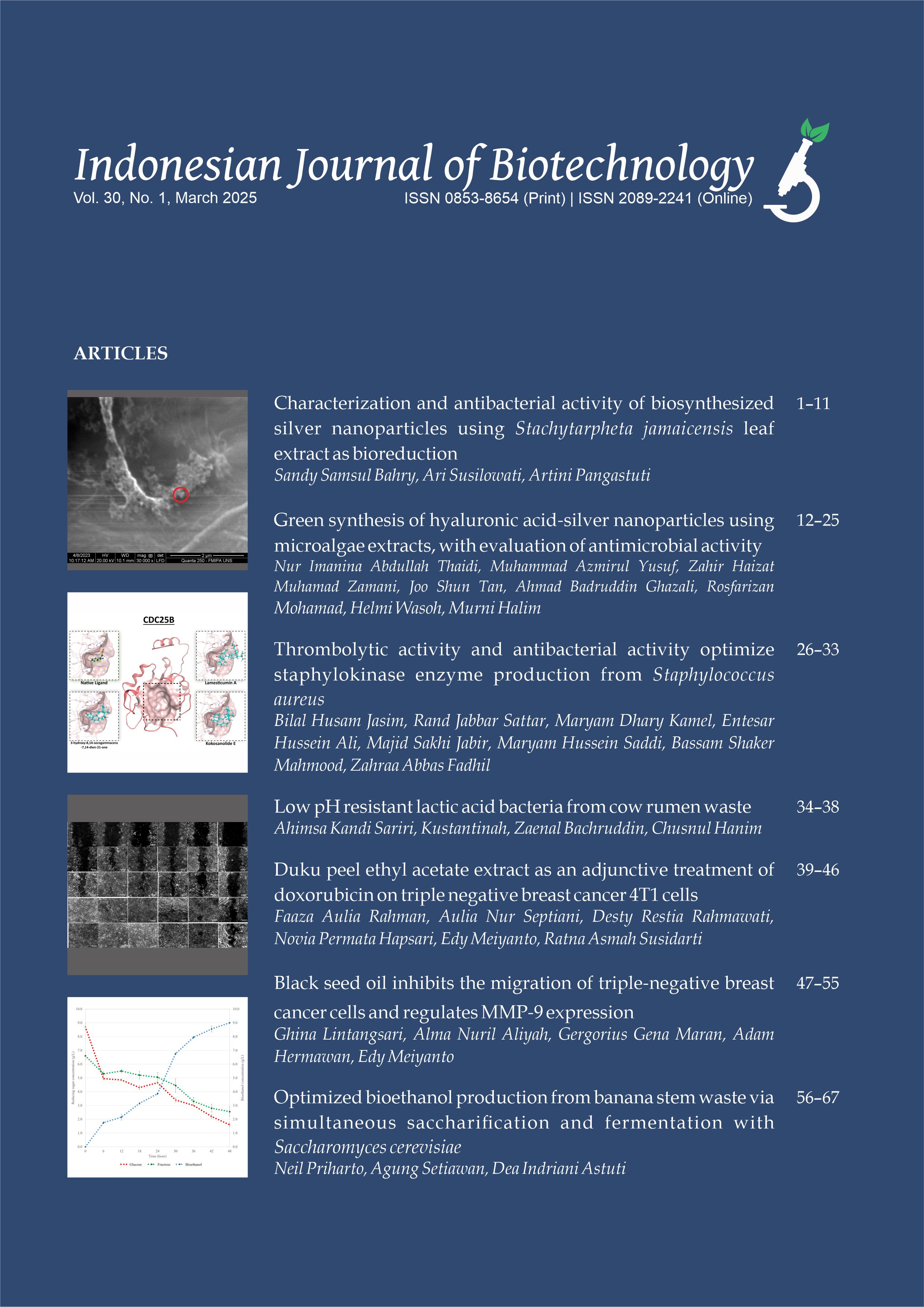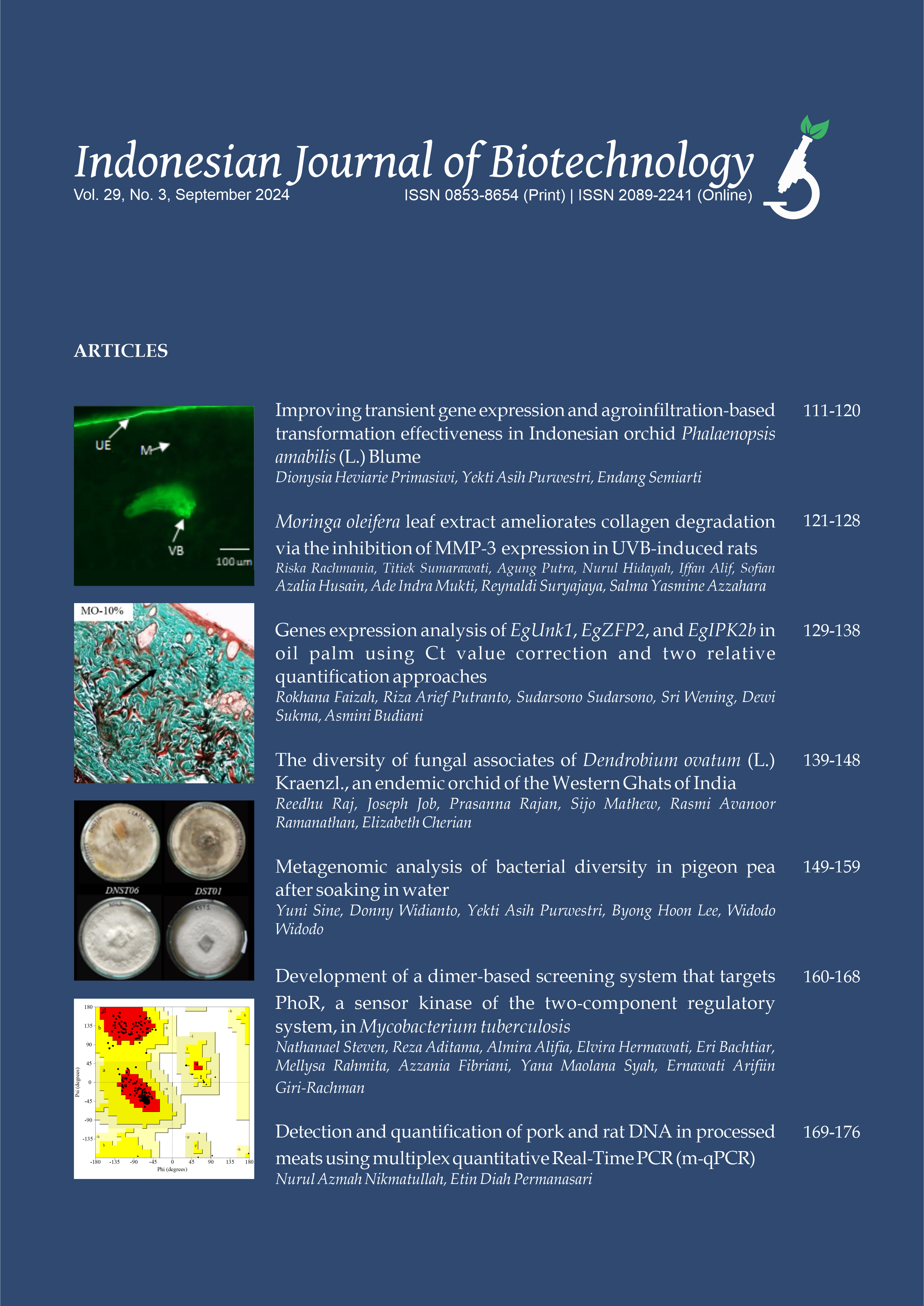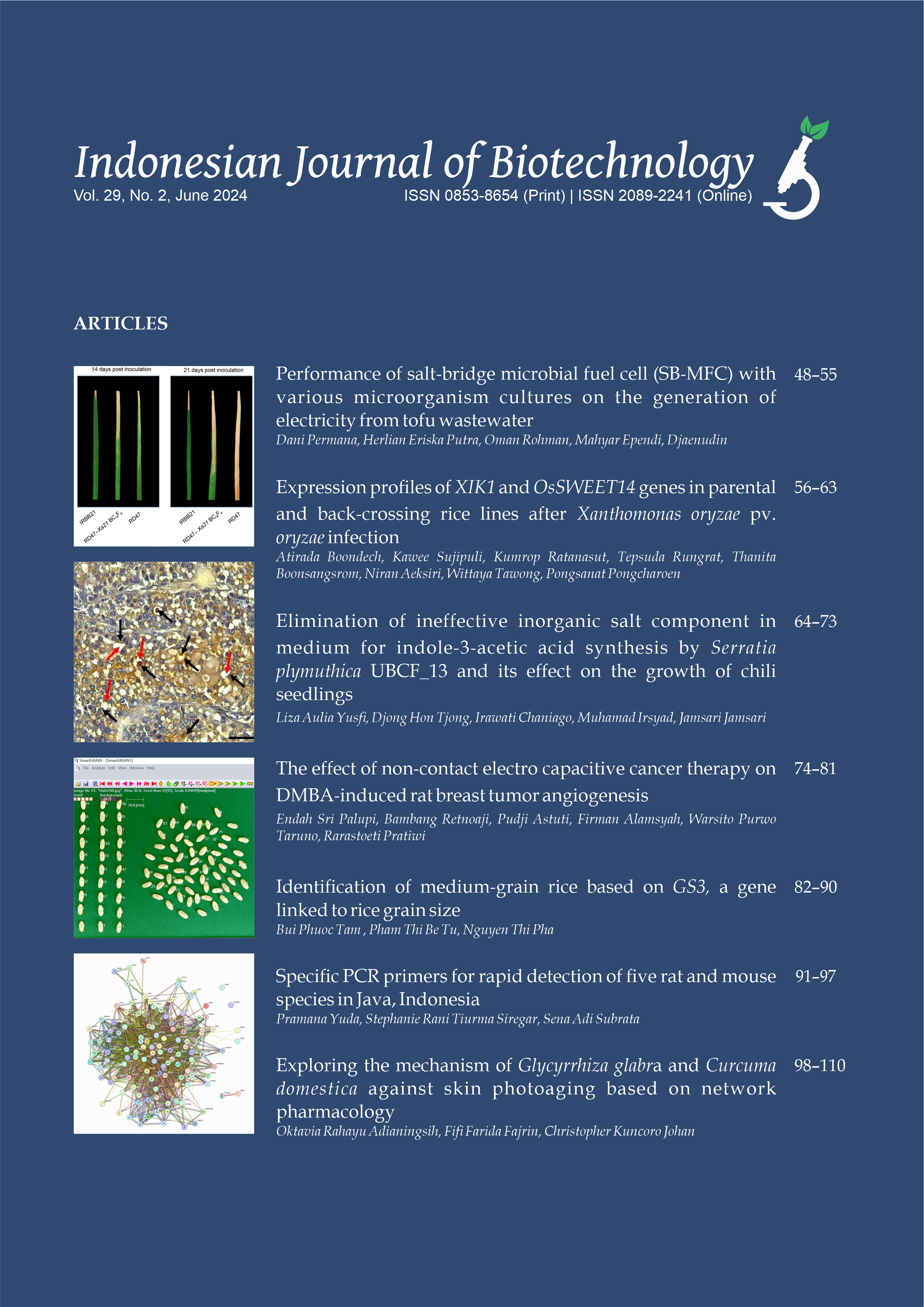Differentiation ability of rat‐mesenchymal stem cells from bone marrow and adipose tissue to neurons and glial cells
Ariyani Noviantari(1*), Ratih Rinendyaputri(2), Ibnu Ariyanto(3)
(1) Centre for Research and Development of Biomedical and Basic Health Technology, National Institute of Health Research and Development (NIHRD), Ministry of Health, Republic of Indonesia, Jalan Percetakan Negara No. 23, Jakarta 10560
(2) Centre for Research and Development of Biomedical and Basic Health Technology, National Institute of Health Research and Development (NIHRD), Ministry of Health, Republic of Indonesia, Jalan Percetakan Nega, Indonesia
(3) Virology and Cancer Pathobiology Research Center, Faculty of Medicine, Universitas Indonesia, Jalan Salemba Raya No. 4, Jakarta 10430
(*) Corresponding Author
Abstract
Mesenchymal stem cells (MSCs) are multipotent cells and can differentiate into neurons and glial cells. In vitro differentiation would be done by the addition of various factors. There remains no comparison for the differentiation of MSCs from rat bone marrow (rBMMSCs) and adipose tissue (rATMSCS) into neurons and glial cells with basic fibroblast growth factor (bFGF), epidermal growth factor (EGF), and brain‐derived neurotrophic factor (BDNF). The aims of this study were to investigate the effect of bFGF, EGF, and BDNF supplementation on the differentiation ability of rBMMSCs and rATMSCs into neurons and glial cells. MSCs were cultured with bFGF and EGF for 4 days and then BDNF was added until day 8. Characterization of MSCs before and after induction was carried out by observing the cell morphology and several cell markers. Flowcytometry analysis was performed for MSCs markers (CD90, CD29) and neurons and glial cell markers (A2B5, Beta‐III‐tubulin, PSAN‐CAM); while MAP‐2, a neuron marker, was analyzed by immunocytochemistry. Induction of both types of MSCs showed MAP‐2‐positive cells, decreased MSCs markers, and in rBMMSCs showed increased neuron markers. The number of neuron marker positive cells in rBMMSCS was higher than rATMSCs. This study showed that the addition of bFGF, EGF, and BDNF to the medium induced rBMMSCs into neurons and glial cells, but the conditions were not optimal for rATMSC as judged by the expression of neural markers (A2B5, Beta‐III‐tubulin, PSAN‐CAM, and MAP‐2).
Keywords
Full Text:
PDFReferences
Anghileri E, Marconi S, Pignatelli A, Cifelli P, Galié M, Sbarbati A, Krampera M, Belluzzi O, Bonetti B. 2008. Neuronal differentiation potential of human adiposederived mesenchymal stem cells. Stem Cells Dev. 17(5):909–916. doi:10.1089/scd.2007.0197.
Baghaban Eslaminejad M, Mardpour S, Ebrahimi M. 2008. Growth kinetics and in vitro aging of mesenchymal stem cells isolated from rat adipose versus bone marrow tissues. Iran J Vet Surg. 3(2):9–20.
Chen SQ, Cai Q, Shen YY, Cai XY, Lei HY. 2014. Combined use of NGF/BDNF/bFGF promotes proliferation and differentiation of neural stem cells in vitro. Int J Dev Neurosci. 38:74–78. doi:10.1016/j.ijdevneu.2014.08.002.
Czarnecka J, Porowińska D, Bajek A, Hołysz M, Roszek K. 2017. Neurogenic differentiation of mesenchymal stem cells induces alterations in extracellular nucleotides metabolism. J Cell Biochem. 118(3):478– 486. doi:10.1002/jcb.25664.
Deng J, Petersen BE, Steindler DA, Jorgensen ML, Laywell ED. 2006. Mesenchymal stem cells spontaneously express neural proteins in culture and are neurogenic after transplantation. Stem Cells. 24(4):1054– 1064. doi:10.1634/stemcells.20050370.
Dietrich J, Noble M, MayerProschel M. 2002. Characterization of A2B5+ glial precursor cells from cryopreserved human fetal brain progenitor cells. Glia. 40(1):65–77. doi:10.1002/glia.10116.
Dominici M, Le Blanc K, Mueller I, SlaperCortenbach I, Marini F, Krause D, Deans R, Keating A, Prockop D, Horwitz E. 2006. Minimal criteria for defining multipotent mesenchymal stromal cells. The International Society for Cellular Therapy position statement. Cytotherapy. 8(4):315–317. doi:10.1080/14653240600855905.
Guan M, Xu Y, Wang W, Lin S. 2014. Differentiation into neurons of rat bone marrowderived mesenchymal stem cells. Eur Cytokine Netw. 25(3):58–63. doi:10.1684/ecn.2014.0357.
Halim D. 2010. Stem Cell: Dasar Teori & Aplikasi Klinis. Erlangga. Hu F, Wang X, Liang G, Lv L, Zhu Y, Sun B, Xiao Z. 2013. Effects of epidermal growth factor and basic fibroblast growth factor on the proliferation and osteogenic and neural differentiation of adipose-derived stem cells. Cell Reprogram. 15(3):224–232. doi:10.1089/cell.2012.0077.
Ikegame Y, Yamashita K, Hayashi SI, Mizuno H, Tawada M, You F, Yamada K, Tanaka Y, Egashira Y, Nakashima S, et al. 2011. Comparison of mesenchymal stem cells from adipose tissue and bone marrow for ischemic stroke therapy. Cytotherapy. 13(6):675– 685. doi:10.3109/14653249.2010.549122.
Jeon SJ, Oshima K, Heller S, Edge AS. 2007. Bone marrow mesenchymal stem cells are progenitors in vitro for inner ear hair cells. Mol Cell Neurosci. 34(1):59– 68. doi:10.1016/j.mcn.2006.10.003.
Lee K, Cha SH, Kang H, Song JY, Lee K, Ko K, Lee H. 2013. Effects of serial passage on the characteristics and chondrogenic differentiation of canine umbilical cord matrix derived mesenchymal stem cells. AsianAustralas J Anim Sci. 26(4):588. doi:10.5713/ajas.2012.12488.
Liang J, Wu S, Zhao H, Li Sl, Liu Zx, Wu J, Zhou L. 2013. Human umbilical cord mesenchymal stem cells derived from Wharton’s jelly differentiate into cholinergiclike neurons in vitro. Neurosci Lett. 532:59–63. doi:10.1016/j.neulet.2012.11.014.
Lim JY, Park SI, Oh JH, Kim SM, Jeong CH, Jun JA, Lee KS, Oh W, Lee JK, Jeun SS. 2008. Brainderived neurotrophic factor stimulates the neural differentiation of human umbilical cord bloodderived mesenchymal stem cells and survival of differentiated cells through MAPK/ERK and PI3K/Aktdependent signaling pathways. J Neurosci Res. 86(10):2168– 2178. doi:10.1002/jnr.21669.
Liu Y, Sturgis CD, Grzybicki DM, Jasnosz KM, Olson PR, Tong M, Dabbs DD, Raab SS, Silverman JF. 2001. Microtubuleassociated protein2: a new sensitive and specific marker for pulmonary carcinoid tumor and small cell carcinoma. Mod Pathol. 14(9):880. doi:10.1038/modpathol.3880406.
Naghdi M, Naghdi M, Tiraihi T, Namin SAM, Arabkheradmand J. 2009. Transdifferentiation of bone marrow stromal cells into cholinergic neuronal phenotype: a potential source for cell therapy in spinal cord injury. Cytotherapy. 11(2):137–152. doi:10.1080/14653240802716582.
Pawitan JA. 2014. Prospect of stem cell conditioned medium in regenerative medicine. BioMed Res Int. 2014. doi:10.1155/2014/965849. Qu J, Zhang H. 2017. Roles of mesenchymal stem cells in spinal cord injury. Stem Cells Int. 2017. doi:10.1155/2017/5251313.
Quartu M, Serra MP, Boi M, Ibba V, Melis T, Del Fiacco M. 2008. Polysialylatedneural cell adhesion molecule (PSANCAM) in the human trigeminal ganglion and brainstem at prenatal and adult ages. BMC Neurosci. 9(1):108. doi:10.1186/147122029108.
Radtke C, Schmitz B, Spies M, Kocsis J, Vogt P. 2009. Peripheral glial cell differentiation from neurospheres derived from adipose mesenchymal stem cells. Int J Dev Neurosci. 27(8):817–823. doi:10.1016/j.ijdevneu.2009.08.006.
Rebelatto C, Aguiar A, Moretao M, Senegaglia A, Hansen P, Barchiki F, Oliveira J, Martins J, Kuligovski C, Mansur F, et al. 2008. Dissimilar differentiation of mesenchymal stem cells from bone marrow, umbilical cord blood, and adipose tissue. Exp Biol Med. 233(7):901–913. doi:10.3181/0712RM356.
Rinendyaputri R, Noviantari A. 2015. Produksi Mesenchymal Stem Cell (MSC) Dari Sumsum Tulang Belakang Mencit. Indonesian Journal of Biotechnology Medicine 4(1):33–41. doi:10.22435/jbmi.v4i1.4211.3341.
Rushing G, Ihrie RA. 2016. Neural stem cell heterogeneity through time and space in the ventricular-subventricular zone. Front Biol. 11(4):261–284. doi:10.1007/s1151501614071.
Safford K, Safford S, Gimble J, Shetty A, Rice H. 2004. Characterization of neuronal/glial differentiation of murine adiposederived adult stromal cells. Exp Neurol. 187(2):319–328. doi:10.1016/j.expneurol.2004.01.027.
Sandhaanam SD, Pathalam G, Dorairaj S, Savariar V. 2013. Mesenchymal stem cells (MSC): identification, proliferation and differentiation. Technical report, PeerJ PrePrints. doi:10.7287/peerj.preprints.148v1.
Soltani MH, Pichardo R, Song Z, Sangha N, Camacho F, Satyamoorthy K, Sangueza OP, Setaluri V. 2005. Microtubuleassociated protein 2, a marker of neuronal differentiation, induces mitotic defects, inhibits growth of melanoma cells, and predicts metastatic potential of cutaneous melanoma. Am J Pathol. 166(6):1841–1850. doi:10.1016/S0002 9440(10)624935.
Stephanie M, et al. 2013. Analisis Hubungan antara Ekspresi MMP2 dengan Derajat Neoplasia Serviks pada Pap Smear Berbasis Cairan. Majalah Patologi Indonesia 22(3).
Tohill M, Mantovani C, Wiberg M, Terenghi G. 2004. Rat bone marrow mesenchymal stem cells express glial markers and stimulate nerve regeneration. Neurosci Lett. 362(3):200–203. doi:10.1016/j.neulet.2004.03.077.
und Halbach OvB. 2007. Immunohistological markers for staging neurogenesis in adult hippocampus. Cell Tissue Res. 329(3):409–420. doi:10.1007/s00441007 04324.
van Strien ME, Sluijs JA, Reynolds BA, Steindler DA, Aronica E, Hol EM. 2014. Isolation of neural progenitor cells from the human adult subventricular zone based on expression of the cell surface marker CD271. Stem Cells Transl Med. 3(4):470–480. doi:10.5966/sctm.20130038.
Wilkins A, Kemp K, Ginty M, Hares K, Mallam E, Scolding N. 2009. Human bone marrowderived mesenchymal stem cells secrete brainderived neurotrophic factor which promotes neuronal survival in vitro. Stem Cell Res. 3(1):63–70. doi:10.1016/j.scr.2009.02.006.
Yang H, Xia Y, Lu SQ, Soong TW, Feng ZW. 2008. Basic fibroblast growth factorinduced neuronal differentiation of mouse bone marrow stromal cells requires FGFR1, MAPK/ERK, and transcription factor AP1. J Biol Chem. 283(9):5287–5295. doi:10.1074/jbc.M706917200.
Zhang J, Jiao J. 2015. Molecular biomarkers for embryonic and adult neural stem cell and neurogenesis. BioMed Res Int. 2015. doi:10.1155/2015/727542.
Article Metrics
Refbacks
- There are currently no refbacks.
Copyright (c) 2020 The Author(s)

This work is licensed under a Creative Commons Attribution-ShareAlike 4.0 International License.









